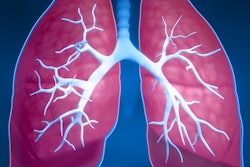
Compliance with low-dose CT (LDCT) lung cancer screening tends to be lower in rural communities, but outreach and patient navigation efforts can boost uptake, according to a study published February 7 in the Journal of the American College of Radiology.
The findings are good news, since it's crucial to address barriers to preventive healthcare services such as lung cancer screening among rural residents, wrote a team led by Dr. Tri Le of the University of Texas Southwestern Medical Center in Dallas.
Rural areas often have fewer radiology facilities, requiring individuals to travel farther for screening services. This obstacle -- as well as that of lower income and education among rural people -- can negatively affect lung cancer screening adherence.
Le's group developed and implemented a community-based lung cancer screening program for 18 counties in northern Texas that featured telephone-based patient navigation services and support for quitting smoking. The team gathered data on low-dose CT referrals, orders, and completed exams that occurred as the result of the program.
The team found that the program increased lung cancer screening compliance rates. In fact, in the program's first year, medical providers referred an additional 570 patients for lung cancer screening. Of these, 488 (86%) were eligible for low-dose CT. Program cost per patient was $430.
"Implementation, uptake, and completion of LDCT-based lung cancer screening is feasible in rural settings," the authors concluded. "Community outreach, health promotion, and algorithm-based navigation may support such efforts. Given low lung cancer screening rates nationally and heightened lung cancer risk in rural populations, similar programs in other regions may be particularly impactful."




















